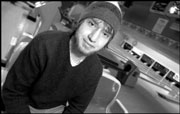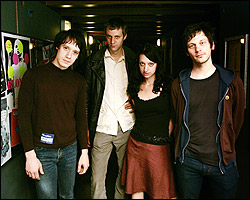THE D.I.Y. MODEL of rock ‘n’ roll encourages each band, musician, record label, ‘zine writer, and fan to use whatever resources are available to create, distribute, and share their own version of musical self-expression. For as long as rock music has existed, rockers have been taking matters into their own hands: The Washington, D.C., bands Minor Threat and Fugazi, for example, prompted a legion of punk kids to self-release their music on cassette tapes and spread the word by handmade fliers, ‘zines, and word-of-mouth. As that wave continues and grows through digital distribution and Napster, progressive progenitors are learning that that all you really need to spread the good word is some magnetic tape, a few postage stamps, and access to a photocopier and the Internet.
Similarly, when Adam Voith finished his first novel—a freestyle coming-of-age-via-the-punk-scene story called Bridges with Spirit—he realized that the best way to get it out there was to publish it himself. As we sit at the Crocodile Cafe, eating lunch and talking about our favorite authors, a picture of Voith as the working- (and rocking-) man’s William Randolph Hearst emerges. By applying the rules— or rather, the lack thereof—of the D.I.Y. tradition to publishing, Voith conceptualized a company called TNI Books, got his first book printed, and began selling it wherever and whenever he could: at rock shows, on consignment, to friends and acquaintances. Soon thereafter, he realized that he wanted to stretch his self-publishing model to include the fiction, graphic art, and creative nonfiction work of others. Eventually, Little Engines, a stylish and compelling biannual literary magazine, began to take shape.
“That was the whole model for me,” says Voith of rock’s D.I.Y. standard. “I have a couple friends who have record labels, and I’ve watched them do it and eventually get to the point where they’re sustaining. I just took the same model and tweaked it a little bit to fit publishing.”
Released in April, the first issue of Little Engines was picked up by the local distribution company Small Changes and is now available at places like Confounded Books, Left Bank Books, Steve’s News, and Elliot Bay Book Co. Held together by the music of language and the language of music, Little Engines compiles pop culture and disseminates the dreams of modern thinkers. Voith selects the entries himself, culling from blind submissions, referrals, and the work of his friends and his friends’ friends. Included in the premiere edition is a lonesome, Cormac McCarthy-esque narrative from a virtually unknown retired Texas lawyer, an interview with and short story by author and NoMediaKings.org creator Jim Munro, a retro-futuristic tale by local freelance writer David Drury, and a comic by Zak Sally, bass player for Minnesotan slow-core outfit Low. Where lit mags like McSweeney’s and Granta cleverly snub their noses at convention, Little Engines skips the arrogance and goes straight for inventiveness.
“There’s this whole attitude that isn’t found in independent publishing yet,” says Voith. “And I think that blows the doors way open. You can literally get away with anything. And people are starving for it. They don’t want to read the new book that Oprah recommended, because they don’t give a damn about Oprah and Oprah’s audience. And while there might be millions and millions of people who do, that doesn’t include anyone that I hang out with. I love the freedom that comes with that.”
AMONG TNI’S OTHER releases are a children’s book, A Guitar for Janie—written by one-name author Buchen and illustrated by Rob Patterson—which is accompanied by a 7-inch record by indie popsters Pedro the Lion, and a compilation of found audiotapes from thrift-store dustbins called Postcards and Audio Letters, put together by local urban folk singer and Sub Pop artist Damien Jurado.
“The whole idea is that it’s not necessarily going to be genre-oriented,” explains Voith, “it’s not all going to be creative nonfiction or whatever. But rather, I just want to establish the company itself as the measure of quality. No matter what it is, whether it’s some strange CD or a book, there’s a trust built up that it’s going to be a quality release.”
Certainly, the idea of selling one’s brand isn’t a new one, “branding” being one of the most overused of the deplorable Internet-spawned marketing buzzwords. But taken in this context, Voith’s goal recalls the heyday of the Sub Pop record label during the early ’90s. The label’s logo alone caused music fans all over the world to scoop up releases by the handful. It was label first, listen later. And Voith hopes that with TNI, a similar pattern will evolve.
Voith will continue to release fiction and creative nonfiction, but aside from those headings, he isn’t putting any restrictions on what TNI can and will do. “Hopefully it’ll mushroom in the same way that punk did,” he says of independent publishing and his own personal endeavor. “I didn’t decide I wanted to do it this until way after I found out about rock ‘n’ roll. Take a band that’s gonna play here [at the Crocodile]: It doesn’t matter if they’ve ever been on TV. . . . If there’s an audience of people that they feel close to, then it’s legitimate and it will extrapolate beyond that. It’s super rewarding to see someone with something that they don’t have an outlet for, and then all the sudden they have one.”
Send Little Engines submissions to TNI Books, 2442 N.W. Market #357, Seattle, WA 98107, or e-mail tnibooks@tnibooks.com. For submission guidelines, to place an order, or for more info, visit www.tnibooks.com.








